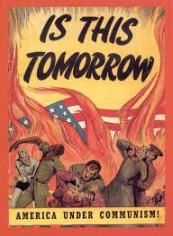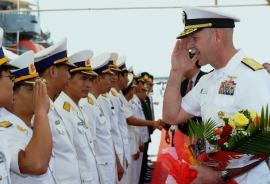A version of this article appeared in the South China Morning Post, 15 November 2012.
“There you go again” is one of the most memorable lines in U.S. Presidential debate history. It was 1980, and Ronald Reagan used it famously to dismiss President Jimmy Carter’s repeated misrepresentations of his plans for social security reform.
I am reminded of this line every time I hear someone, usually a Chinese official, think tank, or academic, refer to U.S. policy in Asia, the so-called “pivot” or rebalancing, as a grand plot to contain China. But even western media are prone to such loose characterizations.
One of the latest iterations came from China’s former Ambassador to Japan who, speaking in Hong Kong earlier this month, cautioned the U.S. against “restraining China’s influence in the region.” Another was Commerce Minister Chen Deming’s statement last week that the U.S. was employing a “Cold War mentality” in its review of two Chinese telecom companies’ proposed investments in the U.S.
President Obama’s upcoming November 17-20 trip back to the region, and what is expected to be a historic visit to Myanmar next week, will no doubt spark new protests from some quarters that the U.S. president, emboldened by his reelection victory, is taking the “pivot” to the next level.
It’s unclear whether such assertions are mere talking points or reflect a genuine perception, but to view U.S. policy in the region as containment is to misread history and ignore deeper trends underway in the global economy.
 Then, unlike now, U.S. containment against the former USSR was a foreign policy and military strategy designed to respond to real and existential threats to the western democratic way of life. Moscow’s belief that there could be no peaceful coexistence between communism and capitalism cried out for a response.
Then, unlike now, U.S. containment against the former USSR was a foreign policy and military strategy designed to respond to real and existential threats to the western democratic way of life. Moscow’s belief that there could be no peaceful coexistence between communism and capitalism cried out for a response.
It came in a famous article written in 1947 by diplomat George Kennan who later became the U.S. Ambassador in Moscow. Kennan argued “it is clear that the main element of the United States policy toward the Soviet Union must be that of long-term, patient but firm and vigilant containment of Russian expansive tendencies.”
No U.S. official today speaks in such apocalyptic terms about China. On the contrary, top U.S. officials have gone out of their way to reassure Chinese counterparts of the “pivot’s” good intentions, the latest occurring during U.S. Secretary of Defense Leon Panetta’s September visit to China. In a speech to the PLA, Panetta stated that U.S. regional rebalancing was not intended to contain, but was “an attempt to engage China and expand its role in the Pacific.”
In many ways, no country has done more to embrace China’s rise and help it integrate into the global economy than the U.S. Much has already been written about the U.S. role in bringing about China’s accession to the WTO, but that was only part of a broader policy aimed at helping usher in China’s emergence onto the world stage as a “responsible partner.”
Not only has the U.S. welcomed China’s role in the G-20 and other multilateral institutions, but it has also explicitly encouraged China to take on greater responsibility in some of the world’s hotspots. U.S. support for a larger role for China’s navy against Somali pirates in the Gulf of Aden is not that of a country pursuing a containment policy.
 The U.S. invitation to China to participate in the 2014 Rim of the Pacific, the largest international maritime exercise, speaks volumes to the U.S. commitment to engage rather than contain. And while Beijing reacted negatively to the U.S. decision to transfer 2,500 U.S. Marines to Australia by 2016, the increase is a mere blip in the already sizeable 320,000 strong U.S. troop presence in the region.
The U.S. invitation to China to participate in the 2014 Rim of the Pacific, the largest international maritime exercise, speaks volumes to the U.S. commitment to engage rather than contain. And while Beijing reacted negatively to the U.S. decision to transfer 2,500 U.S. Marines to Australia by 2016, the increase is a mere blip in the already sizeable 320,000 strong U.S. troop presence in the region.
One leading U.S. academic on a recent visit to Hong Kong stated that if such a containment policy exists, it is largely invisible. And there’s the rub. While China may prefer to see shadows of a non-existent U.S. containment policy, its own new assertiveness in the region is creating a self-fulfilling prophecy, as its Asian neighbors seek their own regional rebalancing in the very alliances and new relationships with the U.S. that China so opposes.
The author is a former US diplomat and was head of the Economic-Political Section at the US Consulate in Hong Kong from 2009-2012.
Recommended Links:
Vietnam’s Overdue Alliance with the US, NY Times
China to Join US-Thailand Cobra Gold Military Drill, Bangkok Post